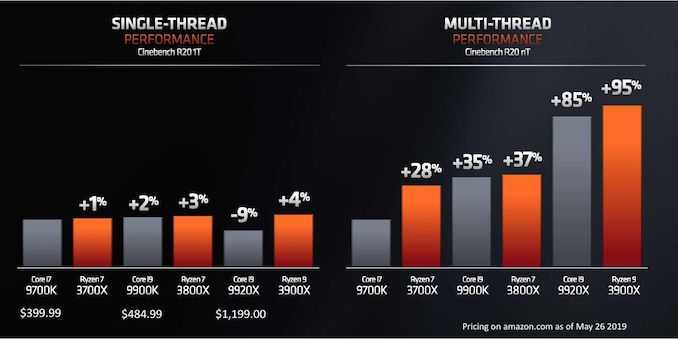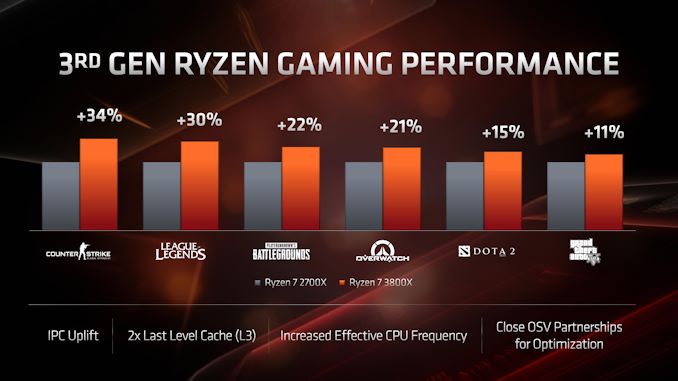AMD Zen 2 Microarchitecture Analysis: Ryzen 3000 and EPYC Rome
by Dr. Ian Cutress on June 10, 2019 7:22 PM EST- Posted in
- CPUs
- AMD
- Ryzen
- EPYC
- Infinity Fabric
- PCIe 4.0
- Zen 2
- Rome
- Ryzen 3000
- Ryzen 3rd Gen
Performance Claims of Zen 2
At Computex, AMD announced that it had designed Zen 2 to offer a direct +15% raw performance gain over its Zen+ platform when comparing two processors at the same frequency. At the same time, AMD also claims that at the same power, Zen 2 will offer greater than a >1.25x performance gain at the same power, or up to half power at the same performance. Combining this together, for select benchmarks, AMD is claiming a +75% performance per watt gain over its previous generation product, and a +45% performance per watt gain over its competition.
These are numbers we can’t verify at this point, as we do not have the products in hand, and when we do the embargo for benchmarking results will lift on July 7th. AMD did spend a good amount of time going through the new changes in the microarchitecture for Zen 2, as well as platform level changes, in order to show how the product has improved over the previous generation.
It should also be noted that at multiple times during AMD’s recent Tech Day, the company stated that they are not interested in going back-and-forth with its primary competition on incremental updates to try and beat one another, which might result in holding technology back. AMD is committed, according to its executives, to pushing the envelope of performance as much as it can every generation, regardless of the competition. Both CEO Dr. Lisa Su, and CTO Mark Papermaster, have said that they expected the timeline of the launch of their Zen 2 portfolio to intersect with a very competitive Intel 10nm product line. Despite this not being the case, the AMD executives stated they are still pushing ahead with their roadmap as planned.
| AMD 'Matisse' Ryzen 3000 Series CPUs | |||||||||||
| AnandTech | Cores Threads |
Base Freq |
Boost Freq |
L2 Cache |
L3 Cache |
PCIe 4.0 |
DDR4 | TDP | Price (SEP) |
||
| Ryzen 9 | 3950X | 16C | 32T | 3.5 | 4.7 | 8 MB | 64 MB | 16+4+4 | 3200 | 105W | $749 |
| Ryzen 9 | 3900X | 12C | 24T | 3.8 | 4.6 | 6 MB | 64 MB | 16+4+4 | 3200 | 105W | $499 |
| Ryzen 7 | 3800X | 8C | 16T | 3.9 | 4.5 | 4 MB | 32 MB | 16+4+4 | 3200 | 105W | $399 |
| Ryzen 7 | 3700X | 8C | 16T | 3.6 | 4.4 | 4 MB | 32 MB | 16+4+4 | 3200 | 65W | $329 |
| Ryzen 5 | 3600X | 6C | 12T | 3.8 | 4.4 | 3 MB | 32 MB | 16+4+4 | 3200 | 95W | $249 |
| Ryzen 5 | 3600 | 6C | 12T | 3.6 | 4.2 | 3 MB | 32 MB | 16+4+4 | 3200 | 65W | $199 |
AMD’s benchmark of choice, when showcasing the performance of its upcoming Matisse processors is Cinebench. Cinebench a floating point benchmark which the company has historically done very well on, and tends to probe the CPU FP performance as well as cache performance, although it ends up often not involving much of the memory subsystem.
Back at CES 2019 in January, AMD showed an un-named 8-core Zen 2 processor against Intel’s high-end 8-core processor, the i9-9900K, on Cinebench R15, where the systems scored about the same result, but with the AMD full system consuming around 1/3 or more less power. For Computex in May, AMD disclosed a lot of the eight and twelve-core details, along with how these chips compare in single and multi-threaded Cinebench R20 results.
AMD is stating that its new processors, when comparing across core counts, offer better single thread performance, better multi-thread performance, at a lower power and a much lower price point when it comes to CPU benchmarks.
When it comes to gaming, AMD is rather bullish on this front. At 1080p, comparing the Ryzen 7 2700X to the Ryzen 7 3800X, AMD is expecting anywhere from a +11% to a +34% increase in frame rates generation to generation.
When it comes to comparing gaming between AMD and Intel processors, AMD stuck to 1080p testing of popular titles, again comparing similar processors for core counts and pricing. In pretty much every comparison, it was a back and forth between the AMD product and the Intel product – AMD would win some, loses some, or draws in others. Here’s the $250 comparison as an example:
Performance in gaming in this case was designed to showcase the frequency and IPC improvements, rather than any benefits from PCIe 4.0. On the frequency side, AMD stated that despite the 7nm die shrink and higher resistivity of the pathways, they were able to extract a higher frequency out of the 7nm TSMC process compared to 14nm and 12nm from Global Foundries.
AMD also made commentary about the new L3 cache design, as it moves from 2 MB/core to 4 MB/core. Doubling the L3 cache, according to AMD, affords an additional +11% to +21% increase in performance at 1080p for gaming with a discrete GPU.
There are some new instructions on Zen 2 that would be able to assist in verifying these numbers.















216 Comments
View All Comments
jamescox - Saturday, June 22, 2019 - link
You seem to just be trying to spread FUD. Also, you don’t seem to know how long a nanosecond is. The CCX to CCX latency can cause slower performance for some badly written or or badly optimized multithreaded code, but it is on such a fine scale that it would just effect the average frame rate. It isn’t going to cause stuttering as you describe.The stuttering you describe could be caused by a huge number of things. It could be the gpu or cpu thermally throttling due to inadequate cooling. If the gpu utilization goes down low, that could be due to the game using more memory than the gpu has available. That will slow to a crawl while assets are loaded across the pci express bus. So, if anyone is actually having this problem, check your temperatures, check your memory usage (both cpu and gpu), then maybe look for driver / OS issues.
playtech1 - Wednesday, June 12, 2019 - link
Good products and good prices.Knock-out blow though? I don't think so for the consumer and gaming space, as I can buy a 9900 today for a fairly small premium over the price of a 3800x and get basically the same performance.
The 12 and 16 core chips look more difficult for Intel to respond to though, given how expensive its HEDT line is (and I say that as an owner of a 7860x).
Atari2600 - Wednesday, June 12, 2019 - link
Yeah, power and thermals are not so important in consumer/game space.In server/HPC, Intel is in deep crap.
Phynaz - Wednesday, June 12, 2019 - link
Bahahaha. No.eva02langley - Thursday, June 13, 2019 - link
Phhh... are you ban from WCCFtech?Gastec - Wednesday, June 19, 2019 - link
I guess I'm neither consumer nor gamer with my i7-860 and GTX 670, G502, G110 and G13. I bought the Logitech G13 just to type better comments on Tweeter :PGastec - Wednesday, June 19, 2019 - link
I also turn OFF RGB whenever I can, anti-cosumerism and anti-social is written on my forehead and everyone is pointing at me on the woke streets.just4U - Thursday, June 13, 2019 - link
I'd say it's a substantial blow to Intel. One of the reasons I picked up a 2700x was the cooler, which is pretty damn good overall.. and the buy in was substantially lower. The 3700x-3800x will only add to that incentive with increased performance (most will likely not even notice..)Drop in the 12-16 core processors (provided there are no tradeoffs for those additional cores..) make the 9900k unappealing on all fronts. The 9700K was a totally unappealing product with it's 8c/8t package..already and after this launch won't make sense at all.
Gastec - Thursday, June 20, 2019 - link
Core i9-9900 I presume. Nowhere to be found for sale in Mordor. Only found one on Amazon.com for $439.99 reduced from $524.95, sold by "Intel" whomever that scammer is.Hamza12786 - Thursday, June 13, 2019 - link
I Like This Site.Also Checkout<a href"https://www.khanzadatech.com/2019/05/zong-unlimite... Unlimited Free Internet</a>